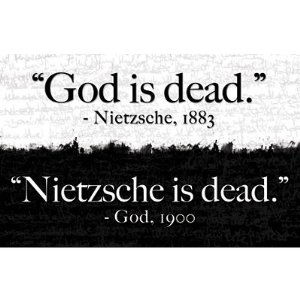A while ago I was talking to a philosophy professor here at my college. I had been discussing ‘rights’, what they really mean and their origins with a friend, and he decided we should take our discussion to the philosophy professor’s office and see what he thought. We had a good talk, which turned fairly quickly to the existence of God and the validity of the Bible, where all philosophical questions seem to end up. We were briefly discussing the debate between creationist scientists and atheist scientists — as that’s really where the clashes arise. The professor pointed out to us that while creationist scientists are extremely invested in their research, evolutionists are not. What he meant was that creationist scientists are essentially looking for facts to prove an position they have already decided upon – that God exists, while atheist scientist have nothing to prove. However, nothing could be farther from the truth.
In 1883, the philosopher Friedrich Nietzsche penned the famous words: “God is dead.” I remember reading a poster at my Bible school last year that had Nietzsche’s quote written with the date, 1883, only below it was written “‘Nietzche is dead.’ -God, 1900.” I found this quite amusing, and certainly a good reminder of the mortality of man. In many ways, arguments in the scientific world often revolve around this statement – either by way of acceptance of it, or rejection.
Science is, and has almost always been, far from objective. Honest reachers will attest to the fact that although people try very hard to be objective, research always carries biases and presuppositions in it. This is the nature of study. For the scientist who already believes in God, all science should match up to the facts that they already believe and should point towards the God they already believe in. And for the atheist scientist it is very much the same, all studies should ultimately support the idea that there is no God, and any evidence that points to a possible God can not remain within their existing beliefs.
An atheist scientist must only find evidence that points to a world without God. Any other evidence would suggest that there is a God and, as a result, they would then be subject to the fact that there is an all-knowing, all-powerful God who demands something of them. Both parties in the scientific debate have a horse in the race. Both are invested, and both stand on presupposed ideas. Because if God is not dead, then there are a lot of people who will have to stand before Him at the end of time and explain why they lived as if He was.

